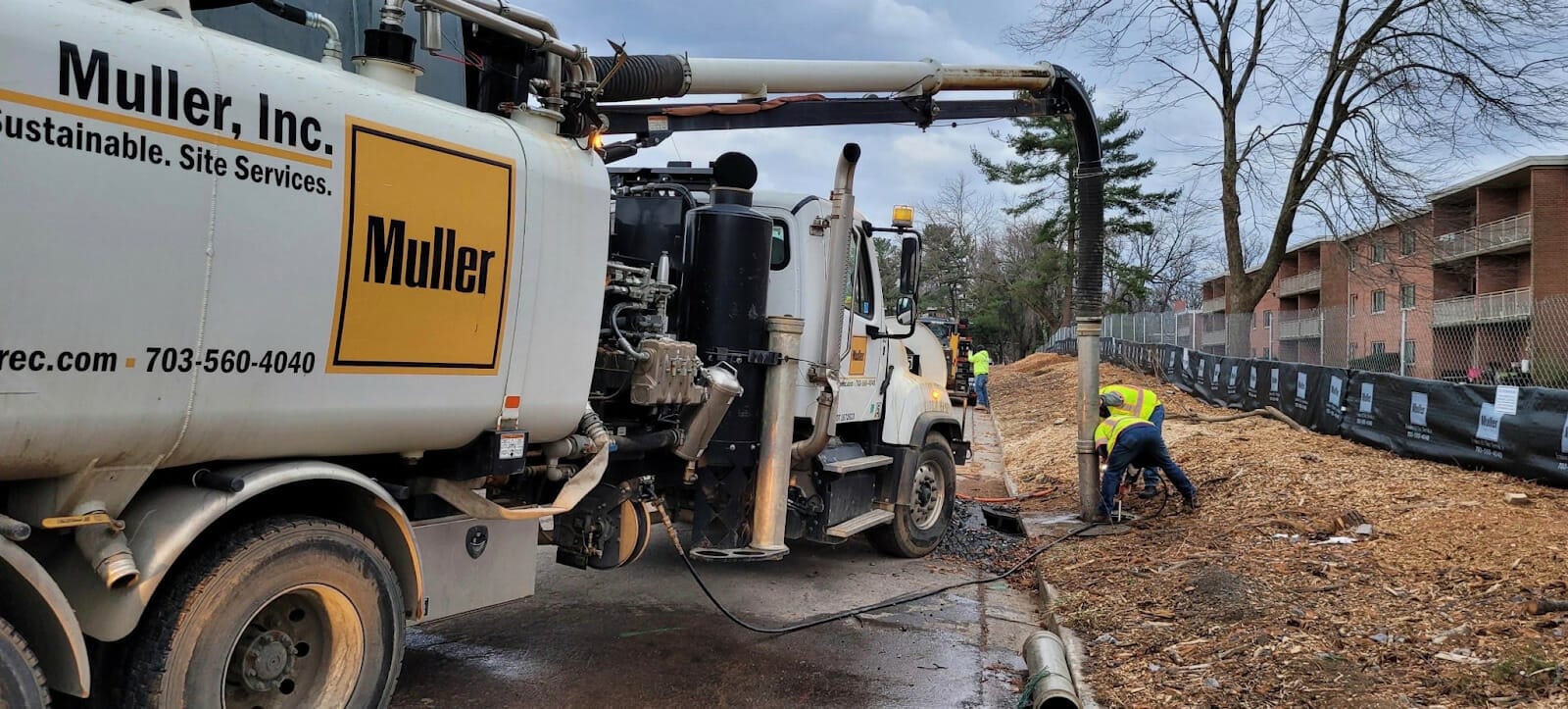One of the most efficient methods of excavation in use today is hydro excavation. Initially invented and employed on frozen Canadian project sites, this form of excavation enables contractors to manipulate the ground with extreme efficiency by using an air vacuum and high-pressure water.
Now standard in the United States, hydro excavation is routinely used across a variety of industries for excavations. The rapid adoption in the U.S., particularly in large metropolitan areas like Northern Virginia, Maryland, and Washington, D.C., is mainly due to hydro excavation’s flexibility, precision, and cost savings.
So What Are the Five Most Common Hydro Excavation Uses?
1. Cold Weather Excavations
This very controlled method of excavation is the safest to use during freezing conditions. It prevents several workers from having to expose themselves to dangerously low temperatures. Typically performed by one or two-man crews, hydro excavation can be utilized to control exposure and limit the health risk posed to workers during manual excavations.
Working in freezing conditions can also result in mechanical problems for traditional excavation equipment. When using heavy machinery in low temperatures hydraulics can become distressed, hoses can crack, and sensitive electronics can fail due to freezing and thawing.
Hydro excavation equipment was explicitly designed to work in harsh conditions. In cold-weather environments, the high-pressure water that hydro excavation relies upon is super-heated to slice through frozen soil. The loosened soil can then be removed by the air vacuum and transported to a truck-mounted tank for disposal.
2. Debris Removal
Hydro excavation is a very efficient technique when used in the removal of debris. The extreme accuracy of hydro excavation equipment means that it is able to clear out structures and debris areas with vacuum and pressurized water. It blasts the latter into the ground and uses the former to suck up the resultant slurry.
Debris removal is often required in places such as demolition and construction sites, vegetation areas, or places that need asphalt or concrete hauling. Hydro excavation equipment is perfectly suited for use in sensitive, small, and tight areas that require debris to be removed in a manner that is not destructive.
3. Daylighting/Potholing
Daylighting and potholing are common ways in which hydro excavation is used. Although the latter can be effective in terms of the installation of signs, utility and telephone poles, fences, and certain other needs that require a post to be set in the ground, the former is the process that exposes underground utilities or pipes to daylight, hence the name.
Daylighting is also responsible for determining the positions of utility lines, including both horizontal and vertical orientations.
There are more advantages to using hydro excavation than is the case for traditional methods of excavation because it does not result in any damage.
Traditional methods of excavation tend to be mechanical and destructive, resulting in damage during the uncovering of underground lines. In contrast, hydro excavation can disperse debris and dirt in a safe manner. It’s able to transform it into a slurry and then have it suctioned away and stored in a tank.
4. Digging Pilings/Pole Holes
Hydro excavation can also be commonly used for the purpose of digging piling and pole holes. The excavation of piling holes involves digging holes of various diameters and depths that can be used for all piling types.
When the process involves underground utilities, using hydro excavation will cause no damage to them. This certainly cannot be guaranteed when more traditional methods of excavation are employed. In turn, additional equipment for the repairing of utilities damaged by the excavation process will not be required.
5. Slot Trenching
Slot trenching refers to the digging of narrow trenches in order to install underground utilities such as pipes, conduits, and cables. Although slot trenches can be created using more traditional excavation methods, hydro excavation is a superior option as it is not only much more operationally efficient but also non-destructive.
Using hydro excavation to carry out slot trenching makes it a lot easier for workers to be able to dig narrow and thin trenches. These trenches can be done with incredible accuracy and remain contained to the particular task they are performing. There will be minimal backfilling, enabling the job to be finished at a much faster rate and the work area will stay tidy as there is no need for the usual heavy equipment.
This method is particularly useful when it is necessary to install small-diameter pipes or to locate utilities.
Hydro excavation solves a great deal of problems associated with traditional excavation methods, offering a safer way of digging and completing excavations. It provides a system that minimizes the damage and disruption excavations can cause to existing infrastructure. Additionally, it’s also safer for workers, better at completing excavations much more quickly, and reduces the need for costly additional pieces of equipment.
Muller, Inc. is an expert in hydro excavation. Contact us today or by calling 703-560-4040 to discuss our services.

